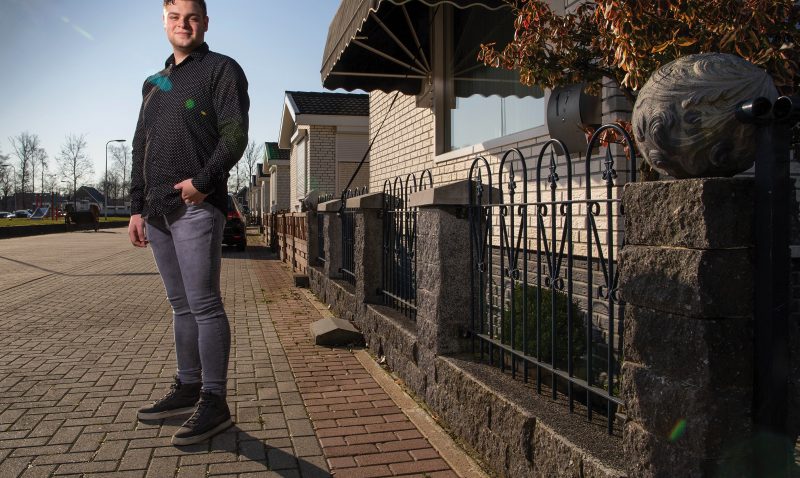Photo text: Windesheim student Guus Kraus: “My sister once was rejected after a job interview because she was living on the trailer camp.
Student Guus lives in a trailer camp
What is it like to live on a trailer park complex? Windesheim student Guus Kraus (22) finds it mostly cosy, living with his whole family around him. “But there is a lot of bias, that aren’t correct. We are very civilized people.”
Guus would preferably never leave here. He has been living where he lives right now ever since he was eight: in a camp in Enschede. Not in a trailer, because of the shortage of trailers he, his mother and sister had to go and live in a regular house, but it is in the middle of their family’s trailers. Guus is very fond of his camp. That is why it is such a shame for the third year student of the History Teacher student programme that there is so much prejudice regarding ‘campers’.
Weed and criminality
“People think that a lot of weed is grown here and that criminality is evermore present on these camps, but this is not true. It was a bit more rowdy back in the day, but those times are over. People think that we are stupid. Like those stereotypical ‘tokkies’ that always walk around in track suits. I have my internship at schools and when I tell them that I come from a camp, they say: ‘Oh, I didn’t expect that from you.’ I don’t really mind the prejudice, but it is still weird that it still exist in 2019. They just are not true.
The new generation cannot be compared to the former generation. Earlier there wasn’t much money so they had to work with what they were given. These days we have an education, a good job and we make something of our lives. And we are civilized people. Of course there are people who live in a trailer park who engage in criminal activity, but in this camp I have never come across criminality.”
No children’s parties
The negative associations with trailer camps have often caused nasty situations for Guus and his family. “My sister was once rejected for a job application because she lived on the camp. Furthermore, when I was younger my classmates were not allowed to come play at my place. It didn’t matter to them where I lived, but the parents acted like it is some sort of gangster neighbourhood here where we walk around with guns.
‘These days we make something of our lives’
It also happened often that every child was invited to a party, except for me. That was really sad. “These days I often take friends with me; they are grownups and can make their own choices.”
Guus’ living condition is considerably different from his friends, who live in a residential area.
“We live together with a few families, which is why you always surrounded by acquaintances or family members. My aunt, my sister, everyone that I grew up with lives next to me.
‘We take care of the elderly until they pass away’
Because you know everyone so well the atmosphere is very easy-going. We don’t always visit one another, but we don’t lock the doors either. In the residential area where I used to live it was like this as well, but much less so.”
Soup for the ill
The norms and values on a camp are different as well, Guus explains. “We try to keep the elderly with us for as long as possible, until they pass away. Only if the family has no other choice because of certain circumstances, we bring the elderly to an elderly home. We find it important to bear that task ourselves. We take care of each other: somebody who is in trouble gets help, somebody who is ill gets soup brought to them.
The fact that everyone knows you so well also has a disadvantage, because everyone keeps an eye on each other. If you really want to keep to yourself, that is hard. You can be left alone for a while, but people still keep a well-intended eye out for you.”
Chair of the trailer council
To think along with all kinds of business, Guus has become a member of the trailer council. “They asked me to, because I am outspoken. Right now I am chairman. We hold meetings about lots of different things such as the accommodation of the camp, the green, the waiting lists, the parking spots and safety. By being a member of the council I can do something for my own people.”
But despite his involvement, Guus does not know whether he wants to live on the camp forever.
“I want to start living on my own soon, and while I would love to live in a trailer, it is the question whether or not that is the right place for me: a trailer needs to become available first. Sadly I will probably be obliged to start living outside of this camp first, in a ‘regular’ student room, and wait to enlist myself on a waiting list so that I can come back later. But if I get a girlfriend, she is not obligated to come live on this camp with me. Maybe I will move to a residential area for her.
My sister too is married to someone from ‘the outside’. The trailer residents don’t mind this anymore: this is the twenty-first century.”
– Silke Polhuijs
